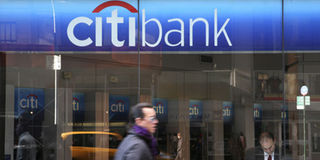US bails out Citigroup with $20bn capital

A man walks past a Citibank branch on the Avenue of the Americas, in New York, November 17, 2008. Citigroup, which has global links, has been affected by widening financial meltdown. Photo/REUTERS
NEW YORK, Monday
The US government has bailed out Citigroup Inc, agreeing to shoulder most of the potential losses on $306 billion of high-risk assets and inject $20 billion of new capital in its biggest move yet to rescue a bank.
The action marks the latest government effort to contain a widening financial meltdown that has caused the disappearance or bankruptcies of companies including Bear Stearns Cos, Lehman Brothers Holdings Inc and Washington Mutual Inc.
Shares of Citi surged 55 per cent to $5.83 in electronic trading before the opening bell in New York. The price of insuring $10 million of Citi bonds through credit-default swaps fell by about half to $257,000 per year.
“Clearly, this will stabilise the (banks) group near term, and the stocks this morning should reflect it,” Oppenheimer & Co analyst Meredith Whitney said. “We are still cautious on the potential future dilution from further prospective capital raises for the group as well as continued higher losses related to credit and asset deflation.”
The government’s $20 billion of new capital comes on top of $25 billion it had put into the bank, and it will receive preferred shares with an 8 per cent dividend in return.
Citigroup received the latest infusion after its shares plunged 60 per cent last week to $3.77, amid worry it lacked enough capital to survive. The bank estimated $40 billion of capital benefits, partially from the government guarantee.
In return for the bailout, Citigroup’s dividend will be effectively wiped out. The bank cannot pay out more than 1 cent per share per quarter over the next three years without government consent. The quarterly dividend is now 16 cents.
Citigroup has the farthest international reach of any US bank, with operations in more than 100 countries. The bank was widely perceived to be too big to be allowed to fail, because any collapse could cause financial havoc around the globe.
“To stabilise the equity, we had to put behind us the issue of Citigroup’s ability to withstand whatever would come,” Chief Financial Officer Gary Crittenden said in an interview.
The New York-based bank will try to modify troubled mortgages in the $306 billion portfolio as the government tries to keep homeowners out of foreclosure.
Chief Executive Vikram Pandit and other top management will keep their jobs, but the government will have the final say on executive pay. More details on compensation may come next week, government officials said.
If the bailout works, the package may become a template for other US banks expected to face growing losses as the economy sinks into recession. Credit losses, once concentrated in mortgages, are already bleeding into other areas such as credit cards and commercial real estate.
The rescue further magnifies the US government’s burden, following bailouts of American International Group Inc, Bear, Fannie Mae and Freddie Mac, and the injection of hundreds of billions of dollars into banks and other financial institutions.
Well over $1 trillion of taxpayer money is at risk, and the Big Three automakers in Detroit are seeking billions more to avert bankruptcy.
The administration of President-elect Barack Obama may also propose a $500 billion to $700 billion economic stimulus.
Citigroup agreed to absorb the first $29 billion of losses on the $306 billion portfolio, plus 10 percent of additional losses, for a maximum total exposure of $56.7 billion. (Reuters)




